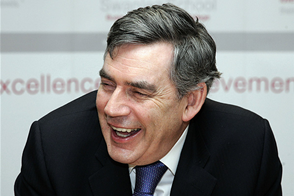Tech needed to fight terror, says PM
Prime Minister Gordon Brown defends technology such as databases and CCTV, saying they are needed to take on new threats.

Technology is necessary to battle terror, crime and other threats but it must be balanced with the right to liberty, Prime Minister Gordon Brown has said.
Speaking to Labour-friendly lobby group Institute for Public Policy Research, Brown said that the UK faces "unprecedented threats" from terrorism, global organised crime and trafficking of drugs and people.
"It could be said that for too long we have used nineteenth century means to solve twenty first century problems. Instead we must have twenty first century methods to deal with twenty first century challenges," Brown said. Whereas before crime fighting depended on fingerprints, police on patrol and photographic identification, now the government can make use of DNA, CCTV and biometrics, he said.
He continued: "But, as I will also suggest today, just as we need to employ these modern means to protect people from new threats, we must at the same time do more to guarantee our liberties."
The Labour government has frequently been criticised for creating a Big Brother state, with rampant use of CCTV and schemes such as the national ID card and database.
Brown stressed that the government has no plans to make it compulsory for people to carry an ID card, but that it will effectively be required to prove ID, such as when opening a bank account or registering with a GP.
He added that the identity card scheme has been redesigned so that people's names and addresses will be held on a separate database from their biometric data.
Get the ITPro. daily newsletter
Receive our latest news, industry updates, featured resources and more. Sign up today to receive our FREE report on AI cyber crime & security - newly updated for 2024.
"Opponents of the identity card scheme like to suggest that its sole motivation is to enhance the power of the state - but in fact it starts from a recognition of the importance of something which is fundamental to the rights of the individual: the right to have your identity protected and secure," he said. "This is why, despite years of exaggeration about its costs and its implications for liberty, public support for it remains so strong."
A poll in the Daily Telegraph at the end of last year showed that support for the scheme had slipped to 43 per cent.
With regards to CCTV, Brown praised the technology for halving crime in Newcastle and helping police investigate the London underground bombings in 2005. But he added that the government must put in place strong safeguards to protect liberty and privacy.
His favour of the technology was made clear, however: "Let us not pretend that CCTV is intrinsically the enemy of liberty. Used correctly, with the right and proper safeguards, CCTV cuts crime, and makes people feel safer - in some cases, it actually helps give them back their liberty, the liberty to go about their everyday lives with reassurance."
Aside from ID cards and CCTV, Brown went on to praise the use of DNA in fighting crime, in particular the National DNA database, which he said matched 40,000 suspects with crimes in one year.
The full text of his speech can be viewed here.
Most Popular





